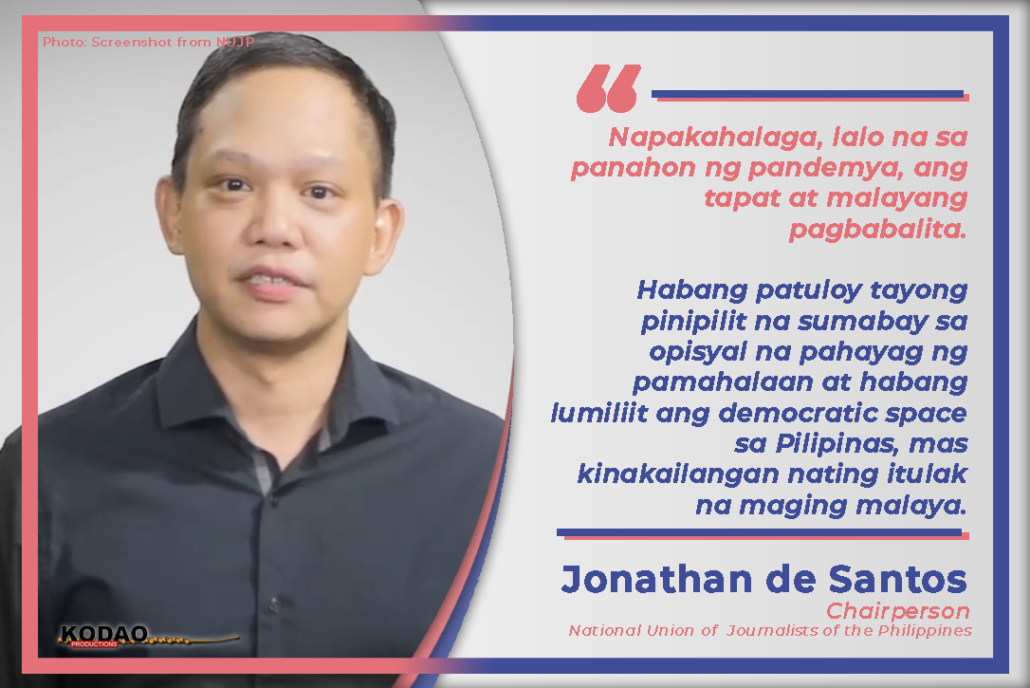STATEMENTS ON THE LISTING OF MEDIA ORGANIZATIONS AS ‘FRONT ORGANIZATIONS’
ALTERMIDYA: On the listing of 3 media organizations as ‘front organizations’: Unconstitutional, dangerous
Altermidya Network denounces the unconstitutional, undemocratic, and dangerous resolution released by the Kalinga Provincial Task Force to End Local Communist Armed Conflict (PTF-ELCAC).
The resolution, which urges the local government to require permits for activities, comes with a list of 18 so-called Communist Party of the Philippines’ “sectoral front organizations” (SFOs). The list, prepared by the 50th Infantry Battalion of the Philippine Army, included three media organizations.
As shown by photos released by Department of Interior and Local Government provincial director Anthony Manolo Ballug, the list included Altermidya members Northern Dispatch and the College Editors Guild of the Philippines (CEGP), along with the National Union of Journalists of the Philippines (NUJP). This has the effect of preventing members of these media organizations from conducting their work as journalists and also puts them in grave danger from the military and the police.
The three media organizations are well-respected and award-winning institutions. The CEGP was established in 1931 and has produced hundreds of venerable journalists. The Northern Dispatch has been producing stories from the communities since 1989, while NUJP, founded by the late Tony Nieva, is known for advancing the rights and welfare of journalists in the country since 1986.
Even the 15 other organizations in the list are known legitimate organizations in Northern Luzon. Preventing them from continuing with their work without a court order is nothing less than undemocratic.
We urge the immediate junking of the Kalinga PTF-ELCAC Resolution No. 2023-04 as well as the 50th IB’s “List of SFOs”. We likewise ask the elected city and municipal officials of Kalinga to reject this dangerous resolution and list.
We will make sure that these attacks on press freedom and democracy are duly reported to the United Nations Office of the Special Rapporteur on Freedom of Opinion and Expression, who is set to conduct in-country investigations early next year. # (June 14, 2023)
= = = = = = = =
NORTHERN DISPATCH: On the inclusion of Northern Dispatch and other media groups in the 50th IB list of ‘Threat Groups’
We cannot help but ask: Is the military threatened by Northern Dispatch? Does the Armed Forces of the Philippines, with their guns, tanks, and bombs, find it difficult to face critical reporting that it must resort to malicious and covert labeling of our outfit, other media groups, and organizations?
The latest ‘secret’ list of alleged ‘Sectoral Front Organizations’ from the 50th IB seems to admit so. With all its might and combat training, the military still labels civilian and media organizations – as ‘Threat Groups.’
While their baseless rhetoric has already turned pathetic, its danger remains potent, enough to result in discrimination of groups and individuals, trumped-up cases, detention, enforced disappearance, and murder.
But the more crucial question is: Why the military considers critical media a threat and merits attention? Is it because our reports not only amplify the people’s democratic aspirations but also expose the ills of society that continue to thrive because of the government’s shortcomings?
Since its establishment in 1989, Northern Dispatch has reported on campaigns and struggles against widespread poverty, feudal exploitation, resource plunder, corruption, human rights violations and abuses, anti-people policies, and the government’s subservience to foreign powers. The people’s narratives we publish illustrate state security forces’ historical and continuing role in protecting this order.
While these stories show the root cause of the armed conflict and the social foundation of inequality and lack of justice, they still go through strict editorial standards. We write them with the Journalists’ Code of Ethics in mind.
Thus, we urge the military and the government to cease the practice of red-tagging and engage us under the rule of law and justice, and in an honorable manner. Prove that you are still capable of rational discourse on issues instead of treating critical media and activist groups as enemies of the state. #
Northern Dispatch Board of Directors, Editors, and Provincial Correspondents
June 14, 2023


